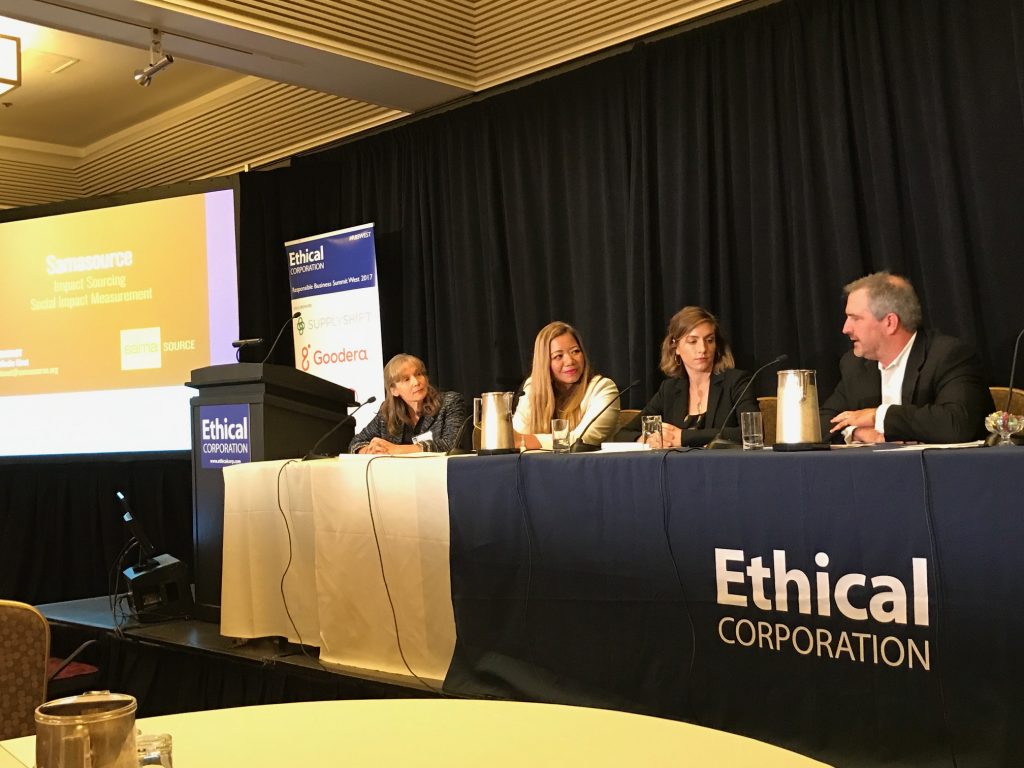
(L-R) Karen Becker from TCNJ School of Business, Anna Lisa Lukes from Golden State Foods, Melodie Kinet from Samasource, and Chris Fox from Hanesbrands at the Responsible Business Summit West
By Laura Ferreiro
The inaugural Responsible Business Summit West took place in San Francisco November 14-15, bringing together top business leaders, nonprofits, think tanks and academics to discuss issues surrounding Corporate Social Responsibility (CSR) and ethical business practices.
Among the attendees were brands including Timberland, Google, HP, Levi Strauss, Facebook, Hanesbrands and Target, and nonprofits including United Way, World Vision, Project Wet Foundation, the UN Global Compact and more. The conference, which was organized by the UK-based organization Ethical Corp, tackled important issues including the business value of social impact, how to scale up social impact through partner collaborations, leveraging social purpose as a recruitment tool, and how to realign established businesses around social impact and making it an integral part of their missions.
On Day 1, a compelling panel on how to effectively educate colleagues about the value of CSR brought together reps from Google, Intuit, and Edelman public relations. Diane Wakeley Solinger, Director of Google.org, said that Google is investing $1 billion in three major social good areas: education, economic opportunity, and inclusion and social justice. Google is providing funding, volunteers and tools to innovative nonprofits to help them further their work, and this is a key pillar of Google’s business. Solinger admitted that it can be challenging to bring Google’s 80,000 employees along on this journey and to get everyone to feel a part of the social mission. She added that Google would welcome the opportunity to collaborate with other tech companies on social good initiatives to broaden their impact. “We go insular too often,” she said.
John D. Edelman explained that Edelman is also “on a journey to embed corporate citizenship and sustainability into everything we do.” In order to do so most effectively, the global PR and marketing firm did a survey to find out which Sustainable Development Goals its employees cared about most, and is targeting its social good efforts to address those issues.
Another compelling panel examined the very important business value of social purpose. HP’s Director of Human Rights and Supply Chain Responsibility Annukka Dickens explained how HP is working across industry borders to make an impact, and showed a video about a program that HP implemented to buy recycled plastics from Haiti to make its printer cartridges while also helping local Haitians to earn money by collecting plastic bottles for recycling and transforming waste into useful products, making it a win-win for everyone involved. Watch the video below:
Zendesk’s VP of Social Impact Tiffany Apczynski said that she hopes CSR departments will be on par with other key operational departments like Human Resources at companies going forward, and mentioned that it has been proven that CSR is closely linked with employee contentment.
On the second day of the conference, an External Keynote discussion about the need for businesses to go beyond compliance was delivered by Michael Kobori, Vice President of Sustainability for Levi Strauss, and Marcel Jacobs, Director of Supplier Sustainability for Philips Group.
Kobori explained that when Levi Strauss established supply chain compliance standards to make sure its materials were ethically sourced and workers were treated fairly 25 years ago, several naysayers told them they were crazy and that the business would never survive. “People laughed at us,” he said. “They said it was impossible and it would destroy our supply chain. Flash forward to 2011, and what used to be the ceiling [in supply chain compliance] is now the floor.”
Kobori and Jacobs both admitted that there are many challenges when policing supply chains, such as suppliers that falsify records, but Jacobs explained that it can be reframed as a benefit both the supplier and the buyer when done right. “At first, suppliers saw compliance as a hurdle, but now they see it as a way to strengthen their relationship with us,” Jacobs said.
Later in the afternoon during the Millennial Keynote discussion, students from UC Berkeley and the University of San Francisco spoke about which employer attributes are most important to them when looking for a job, shedding more light on this for many of the brands in attendance. “We want to work for companies whose values show in what they do,” said Shoka Marefat, a student at the University of San Francisco, who added that companies that “walk the walk” and don’t just “talk the talk” are most appealing to her. “We’re attracted to companies that value CSR enough to pay top dollar for it and give it as much importance as other operations departments,” added Laura Elstein, a Berkeley student.
The final panel of the conference addressed how to quantify the impact of CSR on businesses’ commercial success. Chris Fox, VP of Corporate Social Responsibility at Hanesbrands Inc, said that employee turnover rates have decreased by approximately 30 percent, largely as a result of his company’s CSR efforts and resulting increased employee satisfaction, saving the company millions of dollars.
Melodie Kinet, Director of Business Development at Samasource, emphasized the importance of storytelling and sharing the stories of the social impact that a company’s initiatives are having with consumers, stakeholders and employees. “It’s really all about storytelling,” Kinet said. “The market is starting to demand this. If you’re not doing it, you’re going to be left behind.”
Fox concurred, and said that Hanesbrands is aspiring to do more storytelling behind the clothing company’s social good efforts. “Things are going on underneath the bedcovers and we don’t talk about it enough,” he said. “It’s the core of our business and consumers are becoming more aware of it. We won’t be left behind.”
